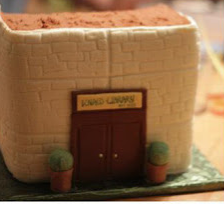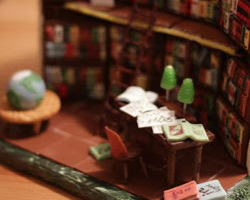Phillip T. Stephens's Blog: Wind Eggs, page 22
January 11, 2017
Indie Publishing News
Claire Plaisted does more than many indie publishers to promote the work of indie writers as a genre. For readers who don’t know about Plaisted Press, I’m including a post with their latest issue of Indie Publishing News.
Indie Publishing News Magazine Issue 8 OUT NOW
This months Magazine had Tory Gates as our Featured Author. A Man of many talents. We also have antoher five interviews from Indie Authors around the world who you need to know about. New Releases, Poetry, a short story…. and much more.
Indie Publishing News. Issue 8 PDF

GET YOUR COPY HERE TODAY


300+ NO FEE Literary Mags & Journals to submit to —— guest blog post by Niccolea M. Nance
For many poets, writing is an act of self-expression. For others creating a poem requires serious thought, a willingness to master the craft, and a desire to open the readers’ eyes to something in the world they’ve never before seen.
For those poets, I’m forwarding Niccolea Nancy’s post with links to three hundred no fee literary journals.
Back in September, I was inspired by an article on Lit Hub by Kim Liao about setting a goal of 100 rejections per year. The idea being that making the rejections the goal would take some of the sting out of getting them and hopefully remove the mental block most people have with submitting caused by their fear of rejections. She suggests, “Collect rejections. Set rejection goals. I know someone who shoots for one hundred rejections in a year, because if you work that hard to get so many rejections, you’re sure to get a few acceptances, too.”
I decided when 2016 was almost over to do set a personal goal of a 100 submissions in 100 days. I have to admit that I was not prepared for how much work this was going to be! Since I am not subscribed to any journals and have only read a few here…
View original post 429 more words


January 9, 2017
Finishing Off That First Draft
Teagan Berry shares some thoughts for writers struggling to finish a draft. While I would never recommend taking a break, shifting direction with new scenes, and talking problems out with other writers never fails.,
You don’t just have to write a new scene to get the thoughts flowing. You might outline new scenes, or simply jot notes for what you can’t get into paper. The important thing is to keep writing, no matter how bad it seems. That’s what editing is for. I can’t tell you the number of scenes I’ve written to keep a story going that I cut from the final draft. Some, however, opened new channels of thinking that made the story work and even improved it (although they still needed editing).
There may, however, come a point when you realize the novel is dead in the water, for whatever reason. I have several manuscripts of 80 or 90 pages that I realized would never float. In that case, Teagan still offers great advice for taking that final break.
by Teagan Berry
Like many writers before me, and sure to be many writers after, I find the final push towards that completed first draft is extremely difficult. For some reason, the brain decides to press hard on the brakes while simultaneously throwing up a wall, breaking all real flow of writing and making it very hard to finish anything, let alone the climactic portion of your novel.
View original post 860 more words


63 poetry publishers who don’t charge reading fees.
Emily Harstone shares a list of poetry publishers who don’t charge reading fees. If you’re looking to get started, this is a good place to start.
However, always make sure to check their site, or order an issue, to find samples of the poems they publish. If your style doesn’t match what you read, don’t pester them. If you’re producing good work, you’ll find a publisher.
Image courtesy of the Free Library of Philadelphia
Emily’s post: 62 Poetry Manuscript Publishers Who Do Not Charge Reading Fees


January 4, 2017
Creating Tone through Dialogue
There are several schools of thought on using the word “said” in dialogue. Many writers believe it’s best to eliminate “he said, she said” from your dialogue entirely. This would eliminate the need for replacing “said” and keep the reader in the dialogue. I agree that if you set up the scene right, and block character activity and non-verbal interaction well then “said” is often unnecessary.
I don’t feel comfortable eliminating said entirely. In some scenes I cut the tag and the dialogue feels wrong. That being said (I couldn’t resist), I’m perfectly comfortable using “said” and not trying to find a replacement. Especially when using adverb linked verbs (chuckled, joked, cried, gasped) that often become shortcuts for description and action that convey the speaker’s state better (and more dramatically).
The third school would argue American language, and readers, follow Anglo-Saxon roots and shorter words, “argued,” “pissed,” “said” read better than longer Latinate words like “advocated, urinated, commented.” I am very much from that school and encourage young writers to avoid longer, polysyllabic words—especially because, in many cases, the Latinate word has a specific connotation inappropriate to the current sentence. E.g., “Holy shit, there’s a bear in my house,” Sally recited, or “If you don’t choose the correct word, not only might you confuse your reader, I will mark your papers down,” Professor Lawrence jabbered.
That being the case, this is a handy list for young writers to have available, and if they find themselves in the situation where a substitute for “said” is needed, this will save a lot of time. I appreciate the effort the Mad Scribbler put into compiling the following post:
Think your manuscript’s filled with repeating words or phrases? “Said” is one of the most re-used terms in the English language, which is a pity considering how many other terms there are for speaking. Below are some simple words that can substitute “said” easily, separated by situations your speaker may be in.
First talker
♣ Began
♣ Started
Talking Next
♦ Acknowledged
♦ Answered
♦ Protested
♦ Responded
♦ Retorted
♦ Replied
Last Speaker
♣ Concluded
♣ Concurred
♣ Determined
♣ Ended
♣ Finished
Keeps Speaking
♦ Elaborated
♦ Commented
♦ Continued
♦ Lectured
♦ Ranted
♦ Surmised
Seeking Attention
♣ Enunciated
♣ Explained
♣ Elaborated
♣ Hinted
♣ Implied
♣ Lectured
♣
♣ Reiterated
♣ Recited
♣ Reminded
♣ Stressed
Judgemental
♣ Advised
♣ Criticized
♣ Suggested
Small Talk
♦ Commented
♦ Guessed
♦ Mentioned
♦ Noted
♦ Observed
♦
♦ Pointed out
♦ Remarked
♦ Stated
♦ Voiced
View original post 384 more words


Quirks: Spice up your story & dialogue
Janice Hardy’s article on character quirks addresses another key problem writers have: blocking dialogue. Too often dialogue is just an exchange of words. But once you’ve mapped our your character’s quirks you can add their gestures, movements, placement into the dialogue to keep the reader engaged. You may also discover you can exchange a line or two of dialogue for action, making the story more alive. Read more at Janice’s Fiction University….
[image error]
Image courtesy of emilysmucker.com


December 25, 2016
On the 12th Day of Catness my Human gave to me…
Merry Christmas, and may every season you celebrate be filled with joy. Pass the peace.
 Chris The Story Reading Ape's Blog
Chris The Story Reading Ape's Blog



December 23, 2016
Let’s write a novel in a month: Part 4—Slow Death | Quirk Books : Publishers & Seekers of All Things Awesome
When ever writers complain about writer’s block, I think of something similar to this graphic:
[image error]
See the full-sized image thanks to:


December 22, 2016
Baking Gingerbread Libraries for the Holidays
What says Christmas more than gingerbread and books? How about a gingerbread library? Alas, no recipe, but this makes great eye candy.

Though I have all of the baking prowess of a self-aware shellfish, I appreciate other people’s skills in that area, especially during this time of year. I recently stumbled across a wonderful baker, Kathy Knaus who fills that cake shaped hole in my heart. Kathy has created a very detailed, multi-tiered library cake.
 The inside view of the cake likely looks very familiar. Gumdrops stand in for the ubiquitous green lamps that appear in many libraries. The books, globes, and other details were created using fondant, and Kathy used edible dyes, pens, and paints to add various other details. It is obvious that a lot of love and care went into the cake’s creation.
The inside view of the cake likely looks very familiar. Gumdrops stand in for the ubiquitous green lamps that appear in many libraries. The books, globes, and other details were created using fondant, and Kathy used edible dyes, pens, and paints to add various other details. It is obvious that a lot of love and care went into the cake’s creation.
I suspect that a classic gingerbread house could also be transformed into a gingerbread library, so if any of you decide to be ambitious and make something similar, you’ll have to share your creation. For fear…
View original post 27 more words


Writer’s Block – The curse that keeps you cursing – Infographic…
The original post to which I’m linking, closed the blog to comments, so I’m reblogging from Chris Graham’s site. I suppose Ian Laurie, the author, was afraid all of the blocked writers would suddenly vent in the comments to his post.
I’ve never been blocked. I have, however been too lazy to write and know the difference. This doesn’t mean the perception of being blocked isn’t real and sometimes crippling. Ironically, the best laxitive for writer’s block is to write. I was fortunate enough to learn this from the late John Vandezande, short story writer whose out of print collection can still be found at resellers for far too little money than his estate deserves. John taught the first fiction class I enrolled in.
When anyone complained of being blocked, John said to start writing anything anywhere at any point in your story. It doesn’t matter how bad it is, when you get to be a good writer, you’ll throw it away in the rewrites anyway. He’s never been wrong.
I learned this teaching writing and visual design courses for more than twenty-five years. (In the design courses I told students to sketch thumbnails, at least fifteen to twenty, no matter how bad.) When I reviewed assignments requiring students to submit all of their work before their final grade, the students who wrote rough drafts (and you can tell who did it and who faked one after the fact) that showed their struggle to get the words out, but they wrote them anyway, always fared better on their assignments.
Similarly, the students who drew thumbnails (many of them truly awful) tended to score at least a grade point higher than their classmates who didn’t.
Think of blockage as a clogged drain. You have to get that crap moving to unplug your drain for the creative flow. Writing out the sludge might feel tedious, but when the last paragraph of crap plops onto the page and you feel the flow pushing your words out faster than you can type, it’s like, well, a feeling of relief not unlike moving past real constipation.
My motto is: “You can’t fix what you haven’t written.” But I also have seen cow patties made into jewelry. Some of that crap you move might actually be polished into shining prose and that gem of a poetic line you always wanted to publish.
 Chris The Story Reading Ape's Blog
Chris The Story Reading Ape's Blog

Source: IAN LURIE at Portent


Wind Eggs
As much as I admire Plato I think the wind eggs exploded in his face and that art and literature have more to tell us, because of their emotional content, than the dry desert winds of philosophy alone. ...more
- Phillip T. Stephens's profile
- 31 followers









